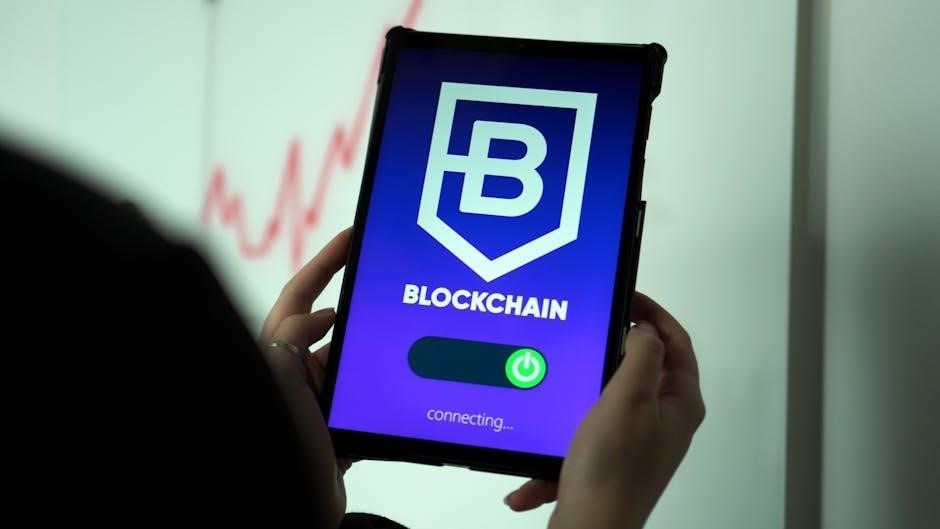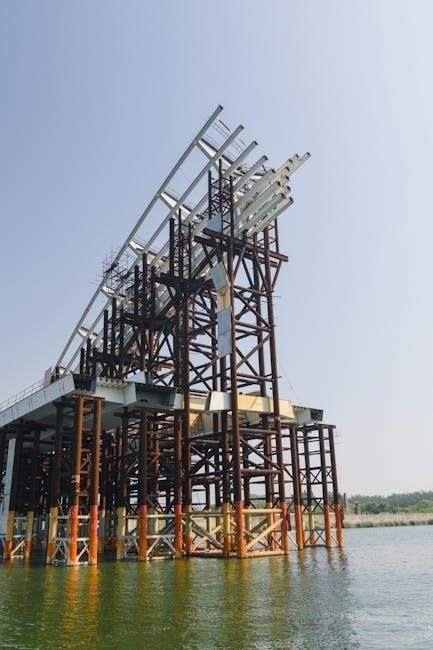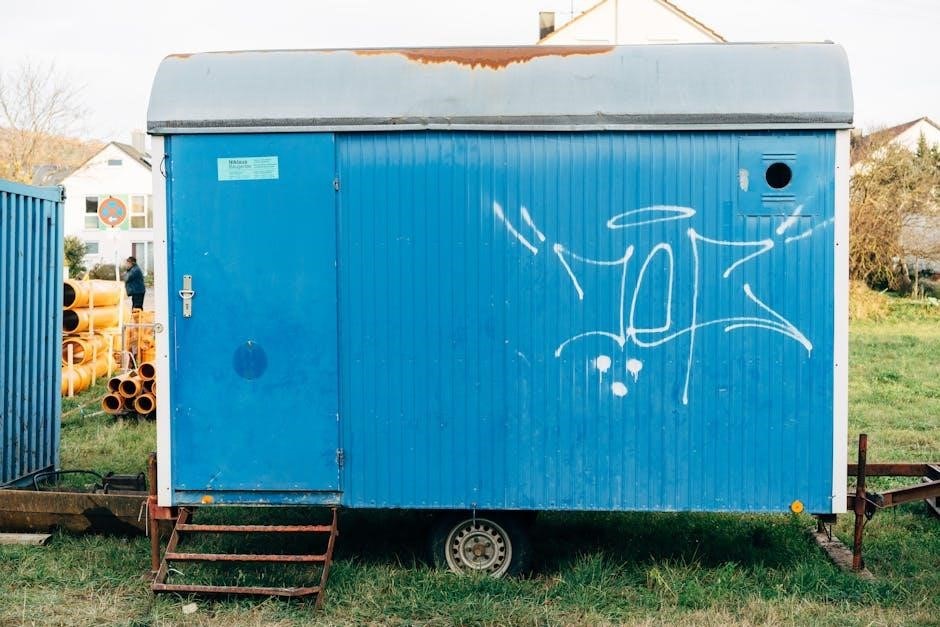Rust, a modern systems programming language, offers memory safety and performance, making it ideal for blockchain development. Blockchain technology enables decentralized, secure applications, and Rust’s unique features enhance this ecosystem, providing efficient and robust solutions for building decentralized applications and custom blockchains.
Overview of Rust Programming Language
Rust is a modern systems programming language developed by Graydon Hoare at Mozilla Research in 2010. Known for its memory safety guarantees and zero-cost abstractions, Rust combines performance with reliability. Its ownership system and borrow checker prevent common errors like null or dangling pointers. Designed for systems programming, Rust offers a safe alternative to C and C++ while maintaining similar performance. Its growing ecosystem and practical applications make it a popular choice for developers.
Blockchain Basics and Its Importance
Blockchain is a decentralized, distributed ledger technology enabling secure, transparent, and tamper-proof data storage. It powers cryptocurrencies like Bitcoin and Ethereum but extends beyond finance, offering solutions for supply chains, healthcare, and more. Its importance lies in promoting trust, reducing centralization risks, and enabling peer-to-peer transactions without intermediaries, fostering innovation and efficiency across industries globally.

Why Rust for Blockchain Application Development
Rust’s memory safety, performance, and concurrency features make it ideal for blockchain development, ensuring robust and efficient decentralized applications without compromising on security or stability.
Advantages of Using Rust in Blockchain
Rust offers memory safety, performance, and concurrency features, ensuring robust decentralized applications. Its type safety prevents common vulnerabilities, while its ecosystem supports building dApps on Ethereum, Solana, and NEAR.
Challenges and Learning Curve
Rust’s steep learning curve poses challenges for developers, especially in understanding ownership and borrowing concepts. Its complexity requires significant time to master, particularly for blockchain development. However, the investment in learning Rust yields efficient, secure, and performant applications, making it a worthwhile endeavor despite the initial difficulty.

Key Tools and Frameworks for Rust-Based Blockchain Development
Rust-based blockchain development leverages tools like Substrate, Solana, and NEAR, enabling efficient creation of custom blockchains and decentralized applications with robust frameworks.
Substrate Framework for Custom Blockchains
Substrate, developed by Parity, simplifies building custom blockchains with Rust. It provides modular components, enabling developers to create tailored blockchain solutions efficiently. Its flexible architecture supports various consensus mechanisms, runtime environments, and interoperability features, making it a powerful tool for crafting unique decentralized applications and networks. Substrate’s robust framework accelerates development, ensuring scalability and security in blockchain projects.
Solana and NEAR Protocols
Prominent blockchain platforms like Solana and NEAR utilize Rust for high-performance dApp development. Solana excels with its high throughput and low latency, while NEAR focuses on scalability and usability. Both leverage Rust’s memory safety and concurrency features to build secure and efficient decentralized applications. Rust’s ownership model ensures robustness, making it ideal for their ecosystems. This approach attracts developers seeking reliable frameworks for blockchain innovation.

Setting Up the Rust Development Environment
Install Rust using rustup, configure your workspace, and utilize tools like Cargo for dependency management to start building blockchain applications efficiently.
Installing Rust and Essential Dependencies
Install Rust using rustup, the official toolchain installer, by running curl --proto '=https' --tlsv1.2 -sSf https://sh.rustup.rs | sh. Once installed, verify with rustc --version. Install Cargo, Rust’s package manager, to manage dependencies. Ensure essential tools like gcc and libc are installed for compiling native code. Use Cargo add to include blockchain-specific libraries like web3 or substrate for your project requirements.
Configuring the Development Workspace
Set up your workspace by installing essential tools like Visual Studio Code with Rust extensions. Configure your project structure using Cargo, ensuring proper module organization. Install additional tools like substrate, Solana CLI, or NEAR CLI based on your blockchain platform. Set up version control with Git and initialize your project with cargo init. Follow Rust coding conventions for clean and maintainable code.

Building Decentralized Applications (dApps)
Rust enables efficient and secure development of decentralized applications on platforms like Ethereum, Solana, and NEAR, leveraging its memory safety and performance for robust dApp implementation.
Developing dApps on Ethereum Using Foundry
Foundry, a Rust-based toolkit, simplifies Ethereum dApp development by enabling rapid contract deployment and testing. It leverages Rust’s memory safety to prevent vulnerabilities, ensuring secure and efficient smart contracts. Developers can install Foundry, deploy contracts, and test functionality seamlessly, focusing on writing robust, scalable code for the Ethereum ecosystem.
Creating dApps on Solana and NEAR
Building dApps on Solana and NEAR leverages Rust’s robust ecosystem for high-performance applications. Solana’s high-speed transactions and efficient smart contracts are ideal for scalable dApps, while NEAR’s sharding and cross-chain interoperability enhance functionality. Both platforms seamlessly integrate with Rust, enabling developers to craft secure, decentralized applications with ease, utilizing tools like Solana CLI and NEAR SDK for streamlined development.
Custom Blockchain Development with Substrate
Substrate, a flexible framework by Parity, enables developers to build custom blockchains using Rust. It offers modular components for consensus, runtime, and networking, allowing tailored solutions; With Substrate, developers can create specialized blockchains optimized for specific use cases, ensuring high performance and scalability while leveraging Rust’s memory safety and concurrency features for robust and efficient decentralized systems.

Memory Management and Concurrency in Rust
Rust’s ownership system and concurrency model ensure memory safety, preventing data races and memory leaks, critical for secure and efficient blockchain application development.
Understanding Ownership and Borrowing
Rust’s ownership system ensures memory safety by managing resource lifetimes. Each value has a single owner, preventing data races; Borrowing allows using values without taking ownership, with mutable and immutable references, enhancing flexibility while maintaining safety. These concepts are critical for building secure and efficient blockchain applications, preventing common vulnerabilities like null pointers and dangling references.
Concurrency and Parallelism in Rust
Rust excels in concurrency with its lightweight threading model and async/await support. The language ensures data safety across threads through ownership and borrowing rules, preventing data races. Channels and mutexes provide efficient communication and synchronization, enabling scalable and concurrent systems. These features are vital for high-performance blockchain applications, where parallel execution and resource efficiency are critical for processing transactions and maintaining network consensus.

Security Considerations in Rust-Based Blockchain Applications
Rust’s memory safety guarantees prevent common vulnerabilities like buffer overflows. Its concurrency model ensures thread safety, reducing risks in decentralized systems. Best practices include fuzz testing and regular audits to maintain robust security in blockchain applications.
Common Vulnerabilities and Mitigation
Blockchain applications in Rust can face vulnerabilities like improper error handling or race conditions. Mitigation involves leveraging Rust’s strict type system and ownership model to prevent data races. Regular audits, fuzz testing, and adherence to best practices ensure robust security. Memory safety features reduce risks like buffer overflows, enhancing overall application reliability in decentralized environments.
Best Practices for Secure Rust Coding
Adopting secure Rust coding practices is crucial for blockchain development. Use established libraries like `web3` and `ethers-rs` for Ethereum interactions. Implement secure smart contract patterns and utilize tools like `solang` for Solidity compilation. Regularly audit code and leverage Rust’s memory safety features to prevent vulnerabilities. Follow community guidelines and test thoroughly to ensure robust and reliable decentralized applications.

Real-World Applications and Case Studies
Rust powers high-performance blockchains like Solana and NEAR, enabling efficient decentralized applications. Its use in protocols like Filecoin and Polkadot showcases its versatility and security in real-world blockchain solutions.
Success Stories of Rust in Blockchain
Rust has become a cornerstone in blockchain development, with prominent projects like Solana, NEAR, and Filecoin leveraging its robust features. Solana’s high-speed transactions and NEAR’s sharded architecture exemplify Rust’s capability in building scalable, secure, and efficient decentralized systems. These success stories highlight Rust’s role in advancing blockchain technology and enabling innovative applications across various industries.
Lessons Learned from Existing Projects
Analysis of Rust-based blockchain projects reveals key insights, such as leveraging Rust’s memory safety for secure smart contracts and optimizing concurrency for high-performance dApps. These lessons emphasize the importance of proper tooling, frameworks like Substrate, and best practices in code auditing to ensure robust and scalable decentralized applications, guiding developers toward efficient blockchain solutions.
Rust’s memory safety and performance are revolutionizing blockchain development, enabling secure and efficient dApps. Its growing adoption and expanding ecosystem promise a future where Rust becomes the preferred language for building robust decentralized solutions.
Emerging Trends and Opportunities
Rust’s role in blockchain is expanding rapidly, with growing adoption in dApps and custom blockchains. Frameworks like Substrate, Solana, and NEAR highlight its potential. Cross-chain interoperability and developer demand are key trends, positioning Rust as a leader in decentralized solutions. Its memory safety and performance make it ideal for scalable and secure blockchain applications, driving innovation and fostering a vibrant ecosystem.
Final Thoughts on Rust’s Role in Blockchain
Rust has emerged as a cornerstone in blockchain development, offering unparalleled memory safety and performance. Its ability to prevent common vulnerabilities ensures robust decentralized applications, making it indispensable for modern blockchain ecosystems. As the technology evolves, Rust’s role is expected to expand, driving innovation and fostering a secure, efficient future for decentralized systems.

Additional Resources and Further Learning
Explore Rust for Blockchain Application Development by Akhil Sharma, available on O’Reilly and Packt. Leanpub offers a Rust Blockchain PDF Guide, while Telegram hosts a Rust Blockchain community for networking and learning.
Recommended Books and Tutorials
Check out Rust for Blockchain Application Development by Akhil Sharma, available on O’Reilly and Packt. The book provides a comprehensive guide to building dApps and blockchains. Additionally, Leanpub offers a Rust Blockchain PDF Guide for hands-on learning. Explore Telegram communities and online forums for networking and additional resources. These resources cover everything from basic Rust concepts to advanced blockchain development.
Online Communities and Forums
Join vibrant communities like the Rust Blockchain Telegram group and Reddit’s Rust community for networking and knowledge sharing. Explore forums like GitHub discussions and Stack Overflow for troubleshooting and insights. These platforms foster collaboration and provide valuable resources for developers, helping you stay updated on the latest trends in Rust-based blockchain development.